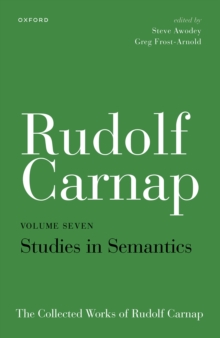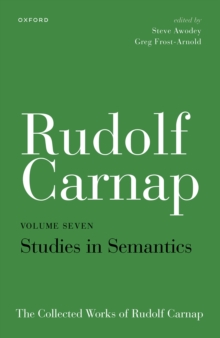
Rudolf Carnap: Early Writings : The Collected Works of Rudolf Carnap, Volume 1 PDF
Edited by A. W. Carus, Michael Friedman, Wolfgang Kienzler, Alan Richardson, Sven Schlotter
Part of the The Collected Works of Rudolf Carnap series
Description
Rudolf Carnap (1891-1970) is generally acknowledged to have been one of the central figures of twentieth-century philosophy.
He was the leading philosopher of the Vienna Circle, a group that was central to the international movement known as logical empiricism, which pursued the goal of making philosophy scientific and eliminating metaphysics that went beyond the limits of what humans can coherently comprehend. Carnap was not only well-versed in this area of thought but also contrary ideas; he interacted philosophically with Gottlob Frege, Bertrand Russell, Ludwig Wittgenstein, Edmund Husserl, and Martin Heidegger, and in his formative years he was influenced by the positivists Mach and Ostwald, neo-Kantians such as Cassirer and Natorp, and Husserl's phenomenology.
Interest in logical empiricism waned in the decades following Carnap's death but was revived towards the end of the twentieth century; thewave of new scholarship that resulted identified Carnap as far more subtle and interesting than was previously understood. The complete fourteen-volume edition of Carnap's published writings builds upon these more recent interpretations of his philosophy.
This first book contains Carnap's early publications up until 1928, none of which have previously been translated from their original German.
The introduction and notes place the text in the relevant scientific and historical contexts, in addition to explaining obscure references or outdated notation and terminology.
Carnap's neo-Kantian origins are more obviousin these works than in his later writings, and the overall figure which emerges from this volume is a very different Carnap to the caricature that many philosophers will know.
Information
-
Download - Immediately Available
- Format:PDF
- Pages:516 pages
- Publisher:OUP Oxford
- Publication Date:25/06/2019
- Category:
- ISBN:9780191065262
Information
-
Download - Immediately Available
- Format:PDF
- Pages:516 pages
- Publisher:OUP Oxford
- Publication Date:25/06/2019
- Category:
- ISBN:9780191065262










